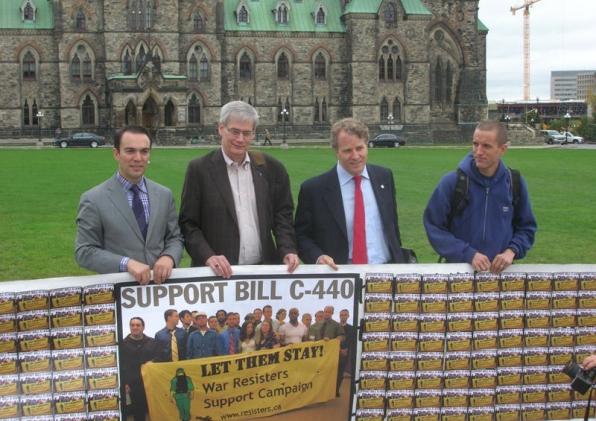The cause of Iraq War resisters in Canada is a cause close to the heart of Michael Hendricks, a same-sex marriage crusader who was part of the court challenges in Quebec. It’s not hard to understand why — Hendricks was originally a Vietnam War resister who settled in Canada in 1968.
“[The Trudeau government] granted us de facto refugee status, and we were able to make little lives here,” he says. Hendricks adds that the current Conservative government’s hard line on war resisters is “hard to believe.”
Bill C-440, a Private Member’s Bill that would allow Iraq War resisters to remain in Canada, is up for a vote on second reading in the House of Commons tonight.
“The idea is very simple, that if someone has a conscientious objection to a war that was not approved by the United Nations, it makes them eligible,” explains Liberal MP Gerard Kennedy, the bill’s sponsor. “This would be what people could look forward to in their [refugee determination] interview to know that there was an acceptance on our part.”
For Iraq War resisters like Chuck Wiley, this bill is crucial to their ability to stay in Canada — especially after a government directive issued to immigration officials this past summer, which would treat war resisters as criminals for deserting their units. Wiley had been in the US military for 17 years, which culminated in a deployment in Iraq in 2006.
“That war to me was unique, simply because it crossed a lot of lines from its very outset, both in terms of international law and common moral principle, that I don’t think conscientious citizens can ignore,” Wiley says. After requesting a transfer to a unit away from the war, he was instead transferred to a unit heading back to Iraq, prompting Wiley to head to Canada instead, in early 2007.
“I found a very warm reception from Canadian citizens, both involved with the campaign and not,” Wiley says. “I couldn’t be more thankful.”
This is the kind of reaction that Hendricks remembers and still sees from Canadians today, even if the government doesn’t extend the same welcome it did for his generation.
But he says it was his experience resisting the Vietnam War that helped inform his later activism for same-sex marriage in Canada.
“In those days, the battle against American militarism and the battle over Vietnam, and the way the government treated us was an educational experience in human rights,” Hendricks says, noting that he came from a family of Republicans in New Jersey and was not exposed to such debates growing up.
“My first poster I ever made and I nailed on a piece of wood to picket with was all about the war,” Hendricks says. “I made those things right on through gay marriage — nothing changed. The style, I did the same kind of pickets, different slogans, same appearance. That was a major training ground.”
Both the Bloc and NDP have pledged to support Bill C-440, and Kennedy believes the Liberals will see it pass second reading as well, so that it can be debated at committee.
“We know that Mr Harper can run away from two motions from New Democrats that have been fully supported by different Parliaments through the House of Commons, but he cannot hide from a binding bill,” says NDP immigration critic Olivia Chow. “It is time for us to settle once and for all, and that the majority of Canadians have said yes to these war resisters, and Mr Harper needs to listen now.”


 Why you can trust Xtra
Why you can trust Xtra


